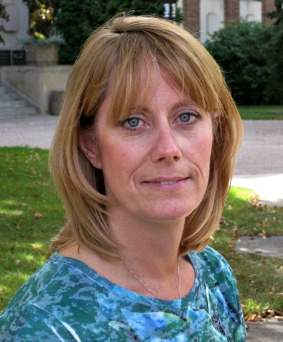
Cara Linzmayer finds that kids are over-scheduled and need time to simply enjoy 'being.'
"Slow down, you move too fast
You gotta make the morning last
Just kickin' down the cobblestones
Lookin' for fun and feelin' groovy…"
Fifty-ninth street bridge song - Simon & Garfunkel
Watch a child lost in thought next to a stream, idly tossing stones, counting tadpoles or digging in the dirt and it's hard not the see the gentling effect of nature on a child. "If you go for a walk with a five-year old they'll point out the magic of nature: the leaves, the shapes, the worms and the feathers," observes Cara Linzmayer, a recent doctoral graduate, who believes children's interactions with nature are critical to their healthy development.
Linzmayer's doctoral thesis looked at the experiences of young children in a botanical garden and their responses to nature. "I wanted to know what it was about kids' experience in nature that made a difference," she says. Taking a multi-dimensional view of their experience Linzmayer says, "I looked at the sensations, the emotion, the cognitive part of the experience and their behaviour. What I found was really important to the children in the study was what they sensed, whether it was pleasurable or not and how they felt - the intensity of their experience."
Her own awareness of the importance of nature in the holistic development of children was piqued when looking for a preschool for her three year-old daughter that had a nature component to its programs.
"Many of them were in church basements and the kids didn't get out much," she says. So, when a friend suggested she open a preschool of her own, she did. "What we did differently was that we went out every day - rain, shine, snow, -40."
The importance of the nature experience, says Linzmayer, manifests in many ways. "It definitely builds stewardship and a caring attitude towards nature in children and it benefits them physically, mentally, emotionally, socially and spiritually."
"In the pre-school when we were outside kids would get along, make friends, talk and problem-solve better. They were much more active. If they were inside it was completely the opposite. It was such a stark contrast that I instinctively knew - and I knew from my own experiences - that nature can be calming and relaxing, and it also has a lot of developmental benefits for kids."
The role of parents and schools in helping children appreciate nature, and have time to simply enjoy it, cannot be underestimated, says Linzmayer. "I see parents taking their children to the park or playground then sitting and texting on their phones. There is no interaction between the child and the parent and that engagement is essential because children are observant and will show you things. They look and do not judge."
Parents can also shape how their children feel about nature too, says Linzmayer, by how they respond to it. "If the parent sees the wonder in a feather, a flower or stone, the child will too. But if the parent recoils from something, and says the feather is dirty, for example, the child will see the feather as something dirty and not to be touched."
Linzmayer, who runs a counselling practice, also weaves nature-based therapy into her recommendations for clients - kids and adults - with anxiety disorders. "Research shows that nature-based leisure helps reduce our anxiety. If you ask someone to create a calm space in their mind, typically it's a place in nature somewhere. I usually recommend to people to get outside. In nature, we're calmer and more physically active and that helps counteract stress."
Getting the message across to educators and parents about nature's benefits for children isn't easy, admits Linzmayer, but it's essential to calm the helter-skelter lives of 21st Century kids and allow them time and space to develop fully. "Change has to come by educating adults about the importance of (nature-based activities) to a child's holistic development," Linzmayer says. "Children's activities are mediated 99.9 per cent by the adults around them, so I think adults need to take some responsibility and slow down their own lives and be there (in nature) with their kids."
- Suggested reading: "Last child in the woods" by Richard Louv